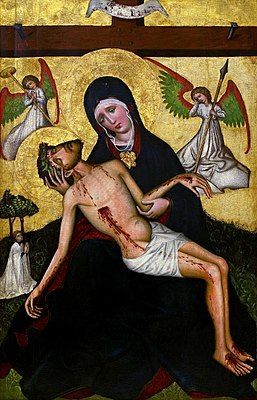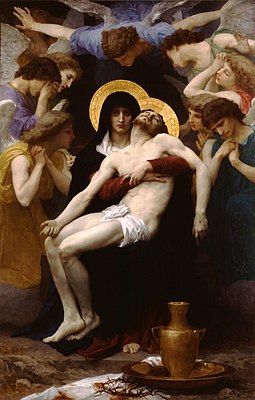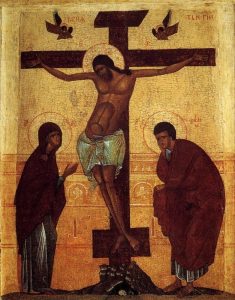
A friend of mine recently told me that mothers hold the sorrows of their children, even, and perhaps especially, after they’ve grown up and moved away. We may not even know the particular sorrow, but we sense it and embrace it nonetheless; Perhaps we offer it up in prayer. After my mother died, I discovered the truth of this in her prayer journal. My brothers and I were listed on those pages, along with our spouses and children. She carried our sorrows as if they were her own.
And so, it is fitting, on this Friday we call Good Friday, to ponder the Pietá. Mary, the mother of Christ, whose soul was destined to be pierced by a sword (Luke 2:35), is pictured holding her crucified, bloodied, lifeless son in her lap. Her face is bereft as she cradles the One who bears all our sorrows.

He was…a man of sorrows, and acquainted with grief;
and as one from whom men hide their faces
he was despised, and we esteemed him not.
Surely he has borne our griefs
and carried our sorrows;
yet we esteemed him stricken,
smitten by God, and afflicted.
But he was pierced for our transgressions;
he was crushed for our iniquities;
upon him was the chastisement that brought us peace,
and with his wounds we are healed. (Isaiah 53:3-5)
This is the paradox of Good Friday. How can anything good come out of the humiliating and brutal death of the One who was the Messiah, the Anointed One? How can it be that His death gives us life and His wounds heal us?
Poet Scott Cairns writes:
How It Was
The earth trembled; its foundations
shook like silt; the sun chagrined,
fled the scene, and every mundane
element scattered in retreat. The day
became the night: for light could not endure
the image of the Master hanging on a tree.
All creation was astonished, perplexed
and stammering, What new mystery is this?
The judge is judged, and yet He holds his peace;
The Invisible One is utterly exposed, and yet
is not ashamed; the Incomprehensible is grasped,
and will not turn indignant; The Immensity
is circumscribed, and acquiesces; the absolutely
Unattainable suffers, and yet does not avenge;
the Immortal dies, and utters not a word;
the Celestial is pressed into the earthen grave,
and He endures! What new mystery is this?
The whole creation, I say, was astonished;
but, when our Lord stood up in Hades—
trampling death underfoot, subduing
the strong one, setting every captive free—
then all creation saw clearly that for its sake
the Judge was condemned, et cetera.
For our Lord, even when He deigned
to be born, was condemned in order
that He might show mercy, was bound
that He might loose, was seized
that He might release, suffered
that He might show compassion, died
that He might give life, was laid in the grave
that He might rise, might raise.
Scott Cairns after Saint Melito of Sardis (190 AD)
Love’s Immensity. Mystics on the Endless Life






